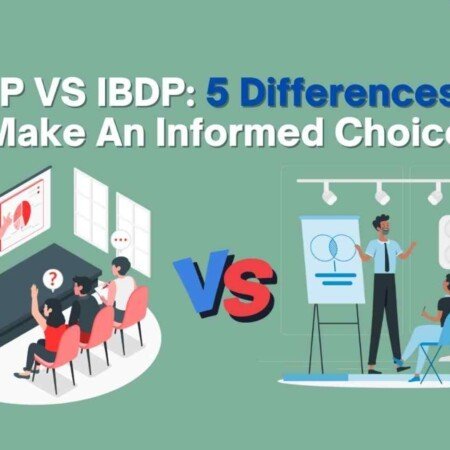The education board plays a vital role in shaping a student’s academic career. In India, two of the most favored education boards are the Central Board of Secondary Education (CBSE) and the International Baccalaureate (IB) board. Both boards have unique strengths and weaknesses, and choosing between them can be challenging for parents and students.
This blog will provide an in-depth analysis of the CBSE and IB boards, highlighting their differences, advantages, and disadvantages, to help you make an informed decision about which board is the right fit for your child. Furthermore, Ignite Training Institute offers full educational assistance for the IB curriculum – MYP & IBDP.
Table of Contents
Some Facts About The CBSE Board
The Central Board of Secondary Education, commonly known as CBSE, is a national-level education board in India. It is the largest board of education in the country and is responsible for conducting exams and providing academic guidance to students from pre-primary to senior secondary level.
CBSE is the largest board of education in India, with over 24,000 schools affiliated with it, both in India and abroad. The board provides academic support and training to teachers and schools to help them maintain high standards of education.
The board conducts examinations for various levels, including Class X, Class XII, and other entrance exams. CBSE is also responsible for developing and revising the curriculum, creating course materials, and evaluating the performance of schools affiliated with the board.
CBSE has also introduced Continuous and Comprehensive Evaluation (CCE), a system that assesses students’ progress throughout the year, rather than just through examinations. The CCE system aims to provide a holistic approach to education and encourages students to develop critical thinking, problem-solving, and communication skills.
CBSE is a prominent education board in India that provides quality education and support to students and schools. With its various initiatives and programs, CBSE aims to improve the education system and prepare students for the challenges of the future.
Related: A-Levels VS CBSE: Comparing World’s Top Education Systems
Pros & Cons Of The CBSE Board
The Central Board of Secondary Education (CBSE) is one of the most popular education boards in India. While CBSE is a highly respected education board that provides quality education and support to students and schools, it also has its own set of pros and cons.
Pros of CBSE Board:
- Standardized Curriculum: CBSE provides a standardized curriculum, which ensures that students across the country receive the same quality of education, regardless of their location.
- Better Preparation For Competitive Exams: CBSE is known for its emphasis on Science and Mathematics, which prepares students better for competitive exams like the Joint Entrance Examination (JEE) and the National Eligibility cum Entrance Test (NEET).
- Continuous And Comprehensive Evaluation: CBSE has implemented a Continuous and Comprehensive Evaluation (CCE) system that assesses students’ progress throughout the year, rather than just through examinations. This helps students to improve their overall performance.
- Quality Education: CBSE provides quality education and support to students and schools, with a focus on developing critical thinking, problem-solving, and communication skills.
Cons of CBSE Board:
- Rote Learning: CBSE has been criticized for encouraging rote learning and memorization over critical thinking and problem-solving. This approach may not be suitable for students who prefer to learn through practical application.
- High Pressure: CBSE board exams are highly competitive, which puts a lot of pressure on students to perform well. This can cause stress and anxiety, affecting students’ mental health.
- Limited Regional Language Options: CBSE board schools usually offer limited regional language options, which can be a disadvantage for students who want to learn in their mother tongue.
- Limited Focus on Extra-Curricular Activities: CBSE is often criticized for not providing enough emphasis on extra-curricular activities, such as sports and music. This can limit the overall development of students.
Some Facts About The IB Board
The International Baccalaureate (IB) is a non-profit educational foundation based in Geneva, Switzerland, that offers a challenging and comprehensive educational program for students aged 3 to 19. The IB was founded in 1968 and is recognized worldwide as one of the leading education boards for preparing students for higher education and the global workforce.
The IB offers three programs for students: the Primary Years Program (PYP) for students aged 3 to 12, the Middle Years Program (MYP) for students aged 11 to 16, the Diploma Program (DP) for students aged 16 to 19, & the Career-Related Programme (CP). The IB programmes are taught in over 150 countries, with more than 5,000 schools offering the program
The IB programmes are recognized by many universities and colleges worldwide, and it is highly respected by employers in various fields. The program aims to develop students’ intellectual, personal, emotional, and social skills, helping them become lifelong learners who can adapt to the changing needs of society.
IB schools follow a rigorous curriculum that emphasizes the development of well-rounded students who are not only academically strong but also socially and culturally aware. The program encourages students to take an active role in their own learning and to develop an understanding of other cultures and perspectives.
Pros & Cons Of The IB Board
The International Baccalaureate (IB) program is a highly respected education board that offers a comprehensive and challenging educational program. However, like any other education board, the IB has its own set of pros and cons.
Pros of IB Board:
- International Recognition: The IB program is recognized by universities and colleges worldwide, and it is highly respected by employers in various fields. Students who complete the IB program have a better chance of gaining admission to top universities and colleges.
- Comprehensive Curriculum: The IB program offers a comprehensive curriculum that covers a wide range of subjects, including science, mathematics, social studies, languages, and the arts. This broad-based curriculum helps students develop a well-rounded education.
- Emphasis on Critical Thinking: The IB program places a strong emphasis on critical thinking, creativity, and problem-solving skills. This approach prepares students for success in higher education and the global workforce.
- International Mindedness: The IB program encourages students to become internationally minded and to develop an understanding of other cultures and perspectives. This helps students become global citizens and prepares them for success in a globalized world.
Cons of IB Board:
- Cost: The IB program is more expensive than other education boards, and the cost of textbooks and exam fees can add up quickly. This can be a disadvantage for families who cannot afford the high cost of the program.
- Challenging Curriculum: The IB program is highly challenging, and students may find it difficult to keep up with the rigorous curriculum. This can be especially challenging for students who struggle with academic subjects or who have other responsibilities outside of school.
- Limited Regional Language Options: The IB program may not offer many regional language options, which can be a disadvantage for students who want to learn in their mother tongue.
- Limited Flexibility: The IB program may not offer as much flexibility as other education boards, and students may have to take certain subjects they are not interested in. This can limit the overall development of students.
Related: Top 5 Benefits Of The IB Curriculum You Must Know To Get Started
CBSE Or IB Board: 5 Differences To End The Debate
When it comes to choosing the right education board for your child, it can be a daunting task with so many options available. Two of the most popular education boards in India are the Central Board of Secondary Education (CBSE) and the International Baccalaureate (IB) board. In this article, we will discuss five key differences between CBSE and IB boards to help you make an informed decision.
1. Curriculum
One of the biggest differences between the CBSE and IB boards is the curriculum. CBSE follows a more structured and traditional curriculum, while the IB board offers a more comprehensive and interdisciplinary curriculum that is designed to develop students’ critical thinking and problem-solving skills.
2. Assessment
The assessment system in the CBSE board relies heavily on standardized exams, while the IB board uses a combination of internal assessments and external exams. The IB board also places a greater emphasis on projects, presentations, and research-based assignments.
3. Teaching Methodology
The CBSE board uses a more traditional teaching methodology, with a focus on rote learning and memorization, while the IB board encourages a more student-centered approach with a focus on inquiry-based learning.
4. International Recognition
The IB board is widely recognized and respected by universities and colleges around the world, making it a good option for students who plan to study abroad. On the other hand, CBSE is also recognized internationally and is accepted by universities and colleges in India and abroad.
5. Cost
The cost of education on the IB board is significantly higher than that of the CBSE board. IB schools require more resources and specialized faculty, which makes them a more expensive option.
FAQs
1. Is IB Board Better Than CBSE?
It is difficult to say whether the IB board is better than CBSE as both have their own unique strengths and weaknesses. Ultimately, the choice between the two will depend on the individual needs and goals of the student.
2. Which Is Better CBSE Or ICSE Or IB?
It is difficult to say which education board is better among CBSE, ICSE, and IB as each has its own unique strengths and weaknesses. The choice between the boards depends on individual preferences, learning styles, and future aspirations of the student.
3. Is IB More Expensive Than CBSE?
Yes, the IB board is generally more expensive than CBSE due to the cost of textbooks, exam fees, and other materials. However, the cost varies depending on the school and location.
Conclusion

Both CBSE and IB boards have their own unique strengths and weaknesses. The choice between the two ultimately depends on the individual needs, preferences, and future aspirations of the student. While CBSE offers a traditional and structured curriculum, the IB board provides a more comprehensive, interdisciplinary approach that encourages critical thinking and problem-solving skills.
It is recommended that parents and students research and compare both boards thoroughly before making a decision. Ultimately, the education board you choose should align with your child’s goals and learning style to help them achieve their full potential.





